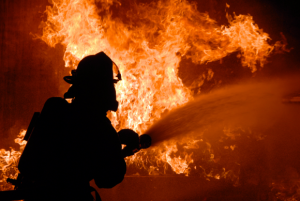Racial diversity in the Fayetteville Fire Department: Rest of the story
31 May 2017
 A growing outcry contends that there are far too few black firefighters in the Fayetteville Fire Department. The argument is that when the Fayetteville population is 41 percent black and 45 percent white, it is unacceptable that only 2.7 percent of the department’s employees are black. I agree with those who say the percentage of black employees does not have to equal the black percentage of the population, but aiming for higher representation is a reasonable goal.
A growing outcry contends that there are far too few black firefighters in the Fayetteville Fire Department. The argument is that when the Fayetteville population is 41 percent black and 45 percent white, it is unacceptable that only 2.7 percent of the department’s employees are black. I agree with those who say the percentage of black employees does not have to equal the black percentage of the population, but aiming for higher representation is a reasonable goal.
What troubles me is the approach being employed by some who are spearheading the efforts to rectify this condition. Among these is the Fayetteville Observer newspaper. I contend the newspaper is pursuing an approach that represents unfairness to some individuals, a failure to present the whole story, and contributes nearly nothing of worth to improving black representation in the Fire Department.
I recently read a Fayetteville Observer editorial titled, “Our View: FD needs to solve its hiring problem.” To me, the point was that the Fayetteville Fire Department alone has responsibility for solving the problem outlined above. My thought was, “Here is more of the thinking that government is responsible for solving every problem visited upon citizens.” That seems to especially be the thinking with regard to Black Americans. Consequently, the pressure is now on City Manager Doug Hewett and Fire Chief Ben Major to get the number of black employees dramatically increased. My life experiences say that there are conditions to be considered over which these men have no control. Among these are the level to which parents are involved in encouraging young people to seek opportunities for advancement; the extent to which prospective employees have seen a positive work ethic modeled; the value candidates assign to educational endeavors. Telling government to, in and of itself, “…solve its hiring problem” is, in my estimation, unfair because these men, or anybody else in government, cannot fix these external conditions. Further, they would probably put their jobs in jeopardy if they violated the rules of political correctness and raised these considerations as I am doing here.
The Observer editorial makes the following statement after a paragraph ending with “…overwhelming whiteness of the department sends a message that will be interpreted by many in this community and beyond as discrimination.”
Fire Chief Ben Major says it’s not so, and the fact that he’s the city’s first African-American fire chief gives him some credence. But only some. He’s been chief since 2011 and six years should be enough time to see the numbers, analyze the reasons and make some changes.
First, the lead-in to the quote regarding Chief Major is the usual default racism narrative. That is, anything that seems unfair to Black Americans, immediately blame it on racism. No need to think it through, gather and thoroughly examine facts, and definitely do not ask the hard questions that might point to any amount of responsibility in the black community. Second, because the chief is black, there is apparently the expectation that he has the power to just make this right and, given that he has not fixed in six years what is a problem across the nation, lay the blame at his feet.
In an effort to get the full story, I talked face-to-face with Chief Major. I wanted to know what has been done, and is being done, by way of increasing the number of blacks employed by the department. Here is some of what I gained from that conversation:
- The Cumberland County Schools Fire Academy is an ongoing program at E.E. Smith High School. It offers a challenging program of study for students interested in a career in the Fire Service; college level classes leading to an Associate degree or Baccalaureate degree through Fayetteville Technical Community College (FTCC) and Fayetteville State University (FSU). Features a unique partnership between Fayetteville Technical Community College (FTCC), Fayetteville State University (FSU), Western Carolina University, The City of Fayetteville Fire Department, Cumberland County Fire Department, Fort Bragg, and E.E. Smith High School. Offers training at the Fayetteville Fire Station on the campus of Fayetteville State University (FSU).
- Recognizing the need for attention to soft skills, such as interviewing and dressing for an interview: instruction in these areas is now being provided.
- Students who complete all phases of the Academy are certified in all but two required areas.
Since graduates of this academy routinely did not meet the 19 year old minimum age requirement for joining the Fire Department, the minimum age was lowered to 18. - The Academy Director is Patricia Strahan, who has spent 30 years in firefighting.
- The Langdon Street fire station was built across from Fayetteville State University as part of a plan to have students study Fire Science at the university and intern at the fire station. This arrangement did not fully materialize because the Fire Science curriculum is only taught online.
- Applicants for employment take an agility and written test. The order in which these tests are given may change from one recruitment process to another. Those who pass the first test given, then take the other. During the most recent recruitment process, the written test was administered first. All applicants who passed the written test advanced to the physical agility test (PAT). The top 80 scores from the written test that also passed the PAT, were interviewed. The remaining applicants are kept on an eligibility list. They would be scheduled for interviews if the listing of 80 from the first round of interviews is exhausted.
- Four workshops were held for applicants in the most recent hiring process. Two provided an introduction to the application process and the other two went over sample test questions from the written test. A booklet of sample test questions was also given to attendees and a PAT course was set up for them to practice. Attendance at these workshops was less than hoped for. Similar workshops will be held leading up to the next application period.
- A sample test booklet is also made available online for purchase by applicants who do not attend a workshop.
- There is an established Diversity Recruitment Committee that is diverse by way of race, gender, and ethnicity. This committee reviews results of the hiring process in an effort to fine-tune, where necessary, to ethically gain greater diversity in the department.
- Over several years, the department has used four different companies as a source for written tests. A primary reason for changing companies was to, as far as possible, insure fairness in the test used. The current test supplier is Firefighter and Police Selection, Inc. The link http://www.fpsi.com/about-fpsi/ gives information on the company.
These points from my conversation with Chief Major present a man who is, within the bounds of what he controls, working this issue in a thoughtful and impressive fashion. My conclusion is that what is needed from others is thoughtful, honest, and non-political addressing of relevant conditions beyond the scope and responsibility of government.
Too often, and to the detriment of Americans, issues that cry out for thoughtful attention and resolution are met with actions that produce tension, societal inertia, and no productive resolution. I hold that the manner in which less than acceptable diversity in the Fayetteville Fire Department is being addressed by the Fayetteville Observer and some individuals of influence is a prime example of this process at work. That is, tension, societal inertia, and no productive resolution. Only as citizens recognize the destructive nature of this process and challenge it will we produce needed change in the multitude of issues and conditions demanding attention.





Leave a Reply